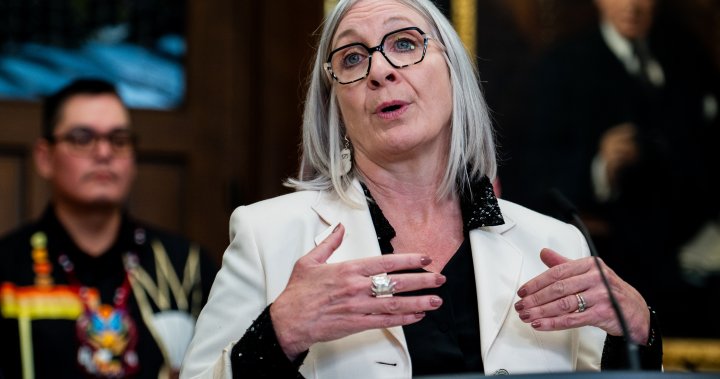One lung ravaged by COVID-19, the other damaged by lung cancer — this was the daunting reality facing 56-year-old Arthur Gillespie, a former police captain from Chicago.
In March 2020, Gillespie found himself hospitalized for 12 days, battling a high fever. This came after he contracted COVID-19 following a visit with his father to see his uncle in a nursing home the month prior.
His father, cousin and uncle died from COVID-19, while Gillespie was hospitalized. During his stay, doctors conducted X-rays of his lungs, revealing an additional concern: something troubling on his right lung.
It turned out to be Stage 1 lung cancer.
“Obviously there’s a silver lining,” Gillespie said. “If it wasn’t for COVID, there’s no telling how long … because there were no symptoms or signs that were presenting themselves that let me know I was in that condition. So I just had to be grateful that it was caught when it was caught.”
January 2021 after Arthur Gillespie’s lung cancer surgery, still needing oxygen.
Northwestern Medicine
In Canada, lung cancer remains the leading cause of death in both men and women, according to the Public Health Agency of Canada (PHAC).
Lung cancer may not cause any signs or symptoms in its early stages, and if it does, it often appears as the tumour grows and causes changes in the body, such as a cough or shortness of breath.
After his hospital discharge, Gillespie started chemotherapy treatments and later underwent surgery at a different health system in November 2020, where surgeons removed two-thirds of his right lung. His goal was to improve and return to work, but that never happened.
Over the following three years, Gillespie continued physical therapy treatments and maintained a workout routine at his home gym. However, despite his dedication, his physical condition progressively declined, leading to a daily reliance on supplemental oxygen.
“I started to feel the regression. I started feeling like I was going in the other direction. So what capabilities I had, I started feeling like I was losing them,” he said. “Despite my best efforts, I could feel myself going backward. My right remaining lung was damaged from lung cancer, and my left lung was damaged from COVID.”
He was told by his health team that there was nothing else that could be done, as his cancer meant he was most likely not a great candidate for a lung transplant. But he knew he needed a second opinion.
‘It was a double hit for him’
Despite what he was told, in September 2023, Gillespie booked a consultation at the Northwestern Medicine Canning Thoracic Institute in Chicago.
The latest health and medical news
emailed to you every Sunday.
Dr. Ankit Bharat, chief of thoracic surgery and director of the Canning Thoracic Institute, said when he first met Gillespie it was “strange to see how incapacitated he appeared for someone of his stature,” as the retired cop could barely speak in a single sentence without getting short of breath.
“I made him walk briefly. He could take barely a few steps before having to sit down,” Bharat said.
Dr. Rade Tomic (left) and Arthur Gillespie (right) looking at an X-ray of Gillespie’s lungs.
Northwestern Medicine
“It was a double hit for him to get not only a severe case of COVID but also lung cancer. Now that lung cancer required the removal of part of his lung, which really impaired his breathing capacity because the remaining left lung and half of the right lung were severely damaged from COVID.”
Four years after the pandemic hit, Dr. Rade Tomic, a pulmonologist and medical director of the Lung Transplant Program at Northwestern Medicine, said it’s rare to see damage to the lungs from COVID-19. However, he said he is starting to see patients who may have had moderate to severe cases of COVID-19 coming in with signs of lung fibrosis (scarring of lung tissue).
“The scarring of the lungs gets more heightened in patients who recovered from COVID but get another respiratory infection like COVID, RSV or influenza because it compounds the original damage that COVID caused,” Tomic explained.
For Gillespie, the pressure inside the lungs had also increased to the point that it was causing heart failure, Bharat explained. This meant his only option for survival was a double-lung transplant.
Bharat and his team decided that Gillespie was a candidate for Northwestern’s clinical program, called the Double Lung Replacement and Multidisciplinary Care (DREAM) Program. And by November 2023, he was listed for a transplant.
‘A second opinion saved my life’
Two months later, Gillespie underwent surgery to receive his new lungs at Northwestern Memorial Hospital in Chicago.
“Jan. 6 was the surgery date. Feb. 4 I watched the Super Bowl with friends. I had my portable oxygen concentrator with me, I didn’t have to use it,” Gillespie said. “And it was that point where I was able to disconnect myself from the oxygen. And I haven’t used the oxygen pretty much since then. That’s a huge, huge, huge difference.”
Arthur Gillespie’s double-lung transplant surgery.
Northwestern Medicine
He added that the recovery from the double-lung transplant has been easier than his recovery from lung cancer surgery.
“A second opinion saved my life and I’m overwhelmed with gratitude for Northwestern Medicine. The lung transplant team listened to my concerns, didn’t dismiss them, and gave me a sense of direction,” he said.
Despite facing the daunting challenges of lung cancer and COVID-19, which traditionally would have deemed him ineligible for a lung transplant, Bharat said his team was able to successfully treat both conditions with the procedure.
“Despite being told ‘no’ by other doctors, Arthur had the courage and determination to keep searching for answers. I feel honoured that we were able to help him since he spent so many years helping the community as a police captain,” he said.
February 2024 after Arthur Gillespie’s double-lung transplant.
Northwestern Medicine
Gillespie still is not sure when he can return to work as a police captain, but said he hopes his story can serve as a lesson, especially for those in law enforcement to prioritize their health.
“When you’re a public servant, it’s easy to become distracted with the routine of the job. You’re used to putting others before your own health, but we have to be equally proactive and seek a second opinion when we know something isn’t right,” Gillespie said.





